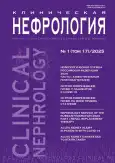Chronic pyelonephritis as a mimics of kidney tuberculosis
- Authors: Kulchavenya E.V.1,2, Kholtobin D.P.2,3, Shevchenko S.Y.4
-
Affiliations:
- Novosibirsk State Medical University
- Avicenna Clinical Hospital
- Altai State Medical University
- City Hospital No. 3
- Issue: Vol 17, No 1 (2025)
- Pages: 47-52
- Section: Clinical case
- Published: 15.03.2025
- URL: https://journals.eco-vector.com/2075-3594/article/view/679273
- DOI: https://doi.org/10.18565/nephrology.2025.1.47-52
- ID: 679273
Cite item
Abstract
Background. The most common reason for late diagnosis of urogenital tuberculosis (UGTB) is low alertness of doctors; the second most common reason is the nature of the course of the disease, the absence of pathognomonic signs, the tendency to be mimics of other diseases.
Description of the clinical case. Patient E., 50 years old, complained of pain in the lumbar region and hypogastrium, periodic increases in body temperature to 37.5 ˚С, frequent urination, constant urine output through the vagina. Epidemiological history is burdened. The onset of the disease was at the age of 25, after which the patient repeatedly took courses of antibacterial treatment with little effect. Tuberculosis (TB) was diagnosed only at the age of 50, when kidney function ceased, cicatricial microcystis and vesicovaginal fistula formed.
Conclusion. The given example demonstrates errors in diagnosis. The long-term, recurrent nature of the inflammatory process against the background of repeated courses of antimicrobial therapy, aggravated contact with tuberculosis should have alerted the doctor to UGTB. Progressive decrease in bladder capacity also indicated a specific inflammation. A single negative PCR test for MBT is not a criterion for excluding TB. A decrease in the number of patients with kidney TB does not mean the disappearance of TB in this localization, but only indicates the difficulty of recognizing this disease.
Full Text
About the authors
Ekaterina V. Kulchavenya
Novosibirsk State Medical University; Avicenna Clinical Hospital
Author for correspondence.
Email: urotub@yandex.ru
ORCID iD: 0000-0001-8062-7775
Dr.Sci. (Med.), Professor, Department of Phthisiopulmonology, Scientific Director, Department of Urology
Russian Federation, Novosibirsk; NovosibirskDenis P. Kholtobin
Avicenna Clinical Hospital; Altai State Medical University
Email: urology-avicenna@mail.ru
ORCID iD: 0000-0001-6645-6455
Dr.Sci. (Med.), Professor, Department of Urology and Andrology with the Course of FPE, Head of the Department of Urology
Russian Federation, Novosibirsk; BarnaulSergey Yu. Shevchenko
City Hospital No. 3
Email: shevchenko_s@list.ru
ORCID iD: 0000-0001-5013-2667
Cand.Sci. (Med.), Deputy Chief Physician
Russian Federation, NovosibirskReferences
- Global tuberculosis report 2024. Doi: https://iris.who.int/bitstream/handle/10665/379339/9789240101531-eng.pdf?sequence=1.
- Kulchavenya E.V., Brizhatyuk E.V., Khomyakov V.T. Tuberculosis of extrathoracic localizations in Siberia and the Far East. Problems of tuberculosis and lung diseases. 2005;82(6):23–26 (In Russ.)
- Kulchavenya E.V., Brizhatyuk E.V., Koveshnikova E.Yu., Sveshnikova N.N. New trends in the epidemic situation of tuberculosis of extrathoracic localizations in Siberia and the Far East. Tuberculosis and Lung Diseases. 2009;86(10):27–31 (In Russ.)
- Krishnamoorthy S., Gopalakrishnan G., Kekre N.S. Genito-Urinary Tuberculosis – A Great Mimicker and Its Atypical Manifestations: An Interesting Case Series. Austin J. Urol. 2017;4(1):1051.
- Özkent M.S., Balasar M., Sönmez M.G., et al. A rare case of kidney loss: urogenital tuberculosis. Porto Biomed. J. 2023;8(1):e201. doi: 10.1097/j.pbj.0000000000000201.
- Grund V.D. Errors in the diagnosis and treatment of tuberculosis of the genitourinary system. Moscow, 1975 (In Russ.)
- Roddy K., Tobin E.H., Leslie S.W., Rathish B. Genitourinary Tuberculosis. 2024 Aug 16. In: StatPearls [Internet]. Treasure Island (FL): StatPearls Publishing; 2025 Jan.
- Kholtobin D.P., Kulchavenya E.V. Mimics of urogenital tuberculosis as a cause of diagnostic errors. Urology. 2017;5:100–5. Doi: https://dx.doi.org/10.18565/urology.2017.5.100-105 (In Russ.)
- Shevchenko S.Yu., Kulchavenya E.V. Is there screening for urogenital tuberculosis? Urology. 2017;6:15–7 (In Russ.)
- Barreto A.A., Lopes H.E., Netto J.M.B., Figueiredo A.A. Urogenital Tuberculosis and Delayed Diagnosis: A Qualitative Study. Urol. Res. Pract. 2024;50(3):198–202. doi: 10.5152/tud.2024.24028.
- Chandran S., Rahman A., Norris J.M., et al. Diagnostic pitfalls of urogenital tuberculosis. Trop Med Int Health. 2021;26(7):753–9. doi: 10.1111/tmi.13583.
- Tuberculosis in adults. Clinical guidelines. Doi: https://roftb.ru/netcat_files/userfiles/KR%20A15-A19%20(vzroslye)%2028.02.2024%20(1).pdf. (In Russ.)
- Federal clinical guidelines for the diagnosis and treatment of urogenital tuberculosis. Doi: https://roftb.ru/netcat_files/doks2015/rec5.pdf. (In Russ.)
- Kulchavenya E.V., Kholtobin D.P. Dynamics of the structure of kidney tuberculosis over 20 years. Ter. arkhiv. 2022;94(11):1239–45. doi: 10.26442/00403660.2022.11.201930 (In Russ.)
- Kulchavenya E., Kholtobin D., Shevchenko S. Challenges in urogenital tuberculosis. World J. Urol. 2020;38(1):89–94. doi: 10.1007/s00345-019-02767-x.
- Minakov N.K. Combined kidney damage by tuberculosis and chronic pyelonephritis and its features in the Far North. Doctor of Medicine Thesis. Moscow, 1987 (in Russ.)
- Supriyadi R., Darmawan G., Pranggono E.H. Renal Tuberculosis: The Masquerader. Acta Med. Indones. 2019;51(4):353–5
- Tuberculosis of the genitourinary system: Guidlene. Edited by T.P. Mochalova. Moscow, 1993 (In Russ.)].
- Mallya A., Karthikeyan V.S., Keshavamurthy R. Is sterile pyuria another minor diagnostic criterion in urinary tuberculosis? Indian J. Tuberc. 2019;66(4): 468–73. doi: 10.1016/j.ijtb.2019.08.004.
- Wise G.J., Schlegel P.N. Sterile pyuria. N. Engl. J. Med. 2015;372(11): 1048–54. doi: 10.1056/NEJMra1410052.
- Sherchan R., Hamill R. Sterile Pyuria. 2024 Aug 12. In: StatPearls [Internet]. Treasure Island (FL): StatPearls Publishing; 2025 Jan.
- Kogan M.I., Naboka Y.L., Ibishev K.S., et al. Human urine is not sterile - shift of paradigm. Urol. Int. 2015;94(4):445–52. doi: 10.1159/000369631.
- Urogenital tuberculosis. Guidelines of Asian Association of UTI&STI. Doi: http://guidelines.aaus.info/aaus/index.php/Urogenital_tuberculosis.
Supplementary files














